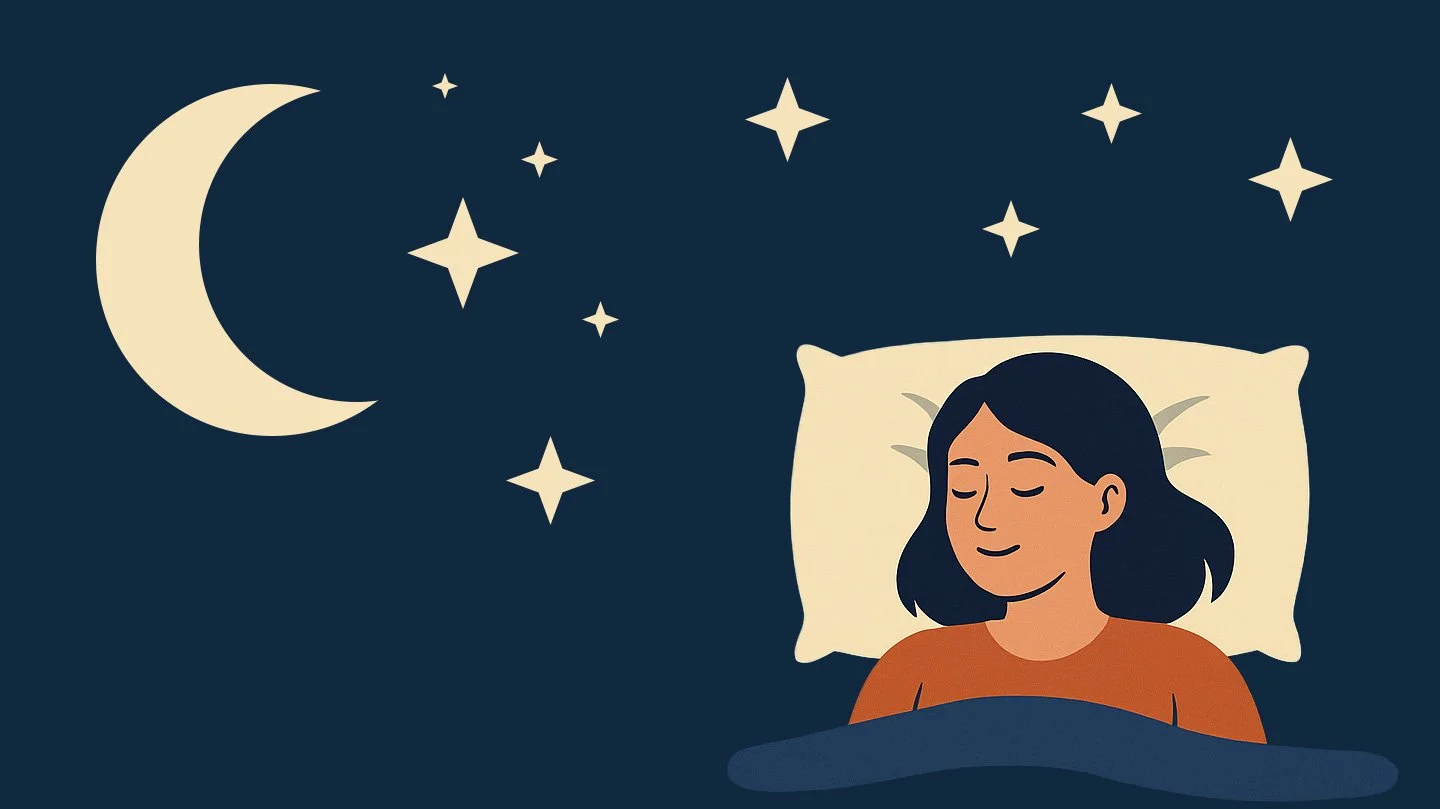How Your Evening Routine Affects Your Sleep
September 19, 2025
Written by Sally Larrington-Brown
Sleep is often called the foundation of health, and for good reason. It affects everything from brain function and metabolism to emotional balance and immune strength. Yet for many of us, quality sleep feels elusive. We climb into bed tired, but our minds race, our bodies resist, and true rest slips away.
The truth is: how well you sleep doesn’t just depend on what happens once your head hits the pillow it depends on how you spend the hours before bedtime. Your evening routine is the bridge between your waking life and restorative sleep. The choices you make during this time can either calm your body and mind, setting you up for deep rest, or sabotage your night without you even realizing it.
Let’s explore how your nightly habits affect sleep quality, and what you can do to create an evening routine that truly supports your rest.
Your Circadian Rhythm: The Body’s Internal Clock
Your sleep patterns are guided by the circadian rhythm, a natural 24 hour cycle that responds to light, food, activity, and social cues. In the evening, your body is wired to wind down, melatonin levels rise, core body temperature drops, and the nervous system shifts into a restorative state.
But here’s the catch: modern routines often override these signals. Bright screens, late night snacks, and stimulating activities can trick your body into thinking it’s still daytime. The result? A delayed or disrupted sleep cycle.
Key Point: The more consistent your evening routine, the stronger your circadian rhythm becomes and the easier it is to fall asleep at the same time each night.
The Role of Light: Setting the Sleep Stage
Light is the most powerful external signal for your circadian rhythm. Bright, blue toned light (like the kind emitted by phones, tablets, and TVs) suppresses melatonin, the hormone that tells your body “it’s time to sleep.”
That’s why binge watching a series in bed or scrolling social media often leads to lying awake long after you put your device down.
Strategies to Try:
Dim household lights an hour before bed to mimic natural sunset.
Create a screen curfew ideally no screens 30–60 minutes before sleep.
If screens are unavoidable, use blue light blocking glasses or enable “night mode.”
Try replacing evening screen time with relaxing, analog activities, reading, journaling, or listening to music.
Food and Drink: What You Consume Matters
What you eat and drink in the evening has a surprising impact on sleep.
Caffeine (found in coffee, tea, soda, and even chocolate) can linger in your system for 6–8 hours, blocking adenosine, a chemical that promotes sleep pressure.
Alcohol may make you drowsy initially, but it disrupts REM sleep, leading to restless nights and groggy mornings.
Heavy or spicy meals can cause indigestion and discomfort, making it harder to relax.
Better Evening Choices:
Finish your last meal at least 2–3 hours before bedtime.
Opt for a light, sleep friendly snack if needed such as yogurt, banana, or a small handful of almonds.
Replace evening caffeine with calming herbal teas like chamomile, valerian root, or peppermint.
Managing Stress: Calming the Nervous System
One of the biggest enemies of sleep is stress. After a busy day, your mind may still be running through to-do lists, worries, or unresolved thoughts. Stress hormones like cortisol keep your body in a state of alertness exactly the opposite of what you need for restful sleep.
Evening Wind-Down Rituals:
Journaling: Write down what’s on your mind, or keep a gratitude list. This helps “empty” your brain before bed.
Breathing exercises: Slow, deep breathing lowers heart rate and signals your nervous system to relax.
Stretching or gentle yoga: Releases physical tension, especially if you’ve been sitting most of the day.
Meditation: Even five minutes of guided meditation can shift you into a calmer state.
Exercise and Movement: Timing Is Everything
Regular exercise improves sleep quality, but the timing of activity is crucial. Intense workouts late in the evening can raise body temperature, elevate heart rate, and stimulate adrenaline all of which delay sleep onset.
On the other hand, gentle movements in the evening, like stretching or yoga, can help relax the body and prepare you for rest.
Tips for Movement:
Schedule vigorous exercise earlier in the day (morning or afternoon).
Use evening movement as a signal to transition into rest slow stretches, foam rolling, or mindful walking.
Creating a Consistent Sleep Routine
Consistency is one of the most underrated aspects of good sleep. Going to bed and waking up at the same times, even on weekends reinforces your circadian rhythm.
Think of your routine as a series of cues that tell your body “it’s time to sleep.” Over time, these cues become powerful triggers, making it easier to fall asleep quickly and naturally.
A Sample Evening Routine Might Include:
9:00 PM – Power down screens and dim the lights.
9:15 PM – Light snack or herbal tea if needed.
9:30 PM – Journaling, reading, or stretching.
10:00 PM – Brush teeth, skincare, or other nightly self-care.
10:15 PM – Breathing exercise or short meditation.
10:30 PM – Lights out, consistent bedtime.
The Bigger Picture: Evening Routines as Self-Care
Your evening routine isn’t just about sleep, it’s about creating a space for yourself at the end of the day. It’s a chance to slow down, check in, and practice mindfulness. When done intentionally, your nighttime habits can feel less like a checklist and more like an act of self care.
Final Thoughts
If you’ve struggled with restless nights, the answer might not lie in expensive supplements or new gadgets, it might be in reshaping your evening routine. By aligning your habits with your body’s natural rhythm, you can create an environment where sleep happens more easily, more deeply, and more restoratively.
Remember: The quality of your tomorrow depends on the care you take with tonight.


